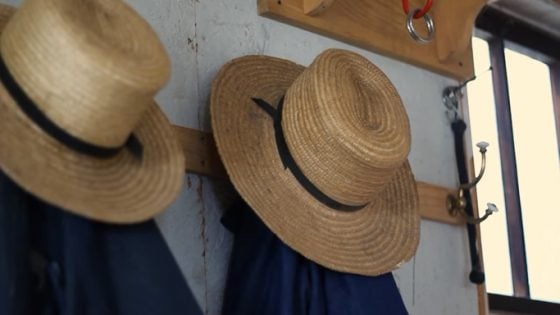Mennonites & Amish Victims Of $60 Million Investment Scheme
This is only the latest in a lengthening line of schemes which have taken advantage of Plain community investors.
From WSOC:
FRANKLIN COUNTY, Pa. — A Pennsylvania accountant defrauded Amish and Mennonite community members out of $60 million after investing their money in a failing dairy he owned, investigators said.
Philip E. Riehl provided accounting services to members in the religious communities. He created an investment company, pooling money raised by selling promissory notes to community members, according to the Securities and Exchange Commission.
Riehl successfully raised many millions in fund over the course of a decade.
He told investors the money would go to loans to finance businesses and real estate purchases for others in the community. But things went in a different direction:
Instead, he sold investors notes issued by Trickling Springs Creamery, a failing dairy company he owned. He did not inform investors of the company’s mounting debt and financial difficulties.
Riehl diverted money to the creamery in 2018 against at least one investor’s wishes.
Riehl asked for two co-signers for his deals. He was apparently aware of the feeling of confidence that would create.
He wrote in an apology letter that this created a “false sense of security, in that such a considerable percentage of the funds were channeled into my personal projects.”
Trickling Springs shut down in September. Riehl soon after filed for bankruptcy.
Members of Riehl’s Mennonite church, as well as Amish, have taken a big hit.
From the Philadelphia Inquirer:
It’s unclear where the $60 million went or if investors will be refunded, but “most of the victims were members of the Little Mountain Mennonite Church or were Amish,” said U.S. Attorney William McSwain in an interview. “That’s a very tight-knit community. Sometimes they don’t interact with law enforcement much, but the allegations were so egregious that many have cooperated.”
Mennonites and Amish victims of Riehl’s alleged crimes also “are hurting financially. They have strict religious beliefs and part of that is they don’t accept government assistance, such as Social Security, unemployment, or welfare,” McSwain said.
However, “they don’t complain. Part of the reason we’re being so public is that we want to spread the word that other victims should contact us.”
Riehl has been excommunicated from his church. He now faces up to 45 years in prison.
Here’s the SEC summary of the case. They also share two documents on preventing affinity fraud and faith-community fraud.
A year back, I listed the numerous scams – totaling well over $100 million in value – which have claimed Amish and Mennonite victims since 2008.
Since it seems appropriate now, I’ll re-post my concluding section of that post here. It may have been too optimistic:
Will the story keep repeating?
With close-knit church communities like Amish and Mennonites, there is built-in trust which can more easily be exploited in what has been termed affinity fraud. Unfortunately that has now happened multiple times.
One possibly positive point, however. These schemes were all occurring at more or less the same time. And all were exposed within a period of six or seven years.
Earl D. Miller ran his business from roughly 2008-2015. The A & M case came to a head with the fund’s bankruptcy in 2010. Pigeon King started in 2001 and had fallen apart by 2008. Sensenig operated from around 1997 until 2009.
Hopefully these cases coming to light in close succession has driven the lesson home, and will help bring an end to an era of large-scale financial exploitation of and within Plain communities.
At the same time, by their very close-knit nature where trust between members is inherent, Amish and Mennonite communities will remain at some risk of this repeating in future.





Love thy neighbor. no exceptions
So sad that people take advantage of their fellow man. I will not get caught up, however, in becoming bitter or unkind to others over things that are happening in our country. There is a new Quaker saying; “Love thy neighbor, no exceptions” and I am sticking to it…..
Usery is a sin...
I hate that someone from within their church did that. But scripture teaches us that usery is wrong. Usery is what is keeping the criminals who are running the federal reserve afloat. Without usery their criminal activities could not exist, would have never existed.
I’m assuming that those Amish Mennonite investors were wanting to make a profit through their investments. They could have just saved their money, or loaned it to others in the church who needed start up money. Many members do that for each other in our church. But most members also make sure that they are included as a part owner in the deed or business.
This is so wrong
You would think that after all the other incidents involving these same kinds of scams in the plain community, that no one would ever fall for anything like this again. And Mr. Riehl will go down in history as a crook. I hope they throw the book at him. He’s a criminal. He’s evil. So his creamery went bankrupt. Whatever on earth did he do with the Sixty Million dollars?
What is the root of all evil? The love of MONEY. It sounds to me like the “investors” fell for this old scam. Why? More money. I want to feel sorry for them but have a hard time doing so.
This is the fifth major investment scheme hitting Plain communities that has come to light since 2008. This looks like one which had already been up and running before most of the other cases had come to light (in 2008, 2009, and 2010), shining a spotlight on this potential threat.
The article I quoted in the post above suggested that he raised the money over a decade, which would put the start of it as somewhere around 2009.
However in the article below I found information that Riehl became majority owner of Trickling Springs in 2007, which would predate the big reveal of even the first scheme, and even a reference suggesting Riehl first started operating on some level way as far as accepting investments back in 1995. So it looks like he had been long well-established in his community.
https://www.mcall.com/news/pennsylvania/mc-nws-pa-trickling-springs-creamery-owner-securities-fraud-20200130-id64edamqrdh7cp2q6vzzfvmjm-story.html
I would hope that anyone who invested in the past 10 years or so in similarly rosy-sounding investment opportunities (in other words, after several of these affinity fraud-driven schemes had already been revealed in a big, painful way) have done their due diligence on to whom they are giving their money. Surely there are trustworthy people helping manage money in Plain communities, but Amish and Mennonites will agree that they are not exempt from having bad apples in their midst.
The term affinity fraud is new to me but I have been a victim myself. Being seduced out of thousands of dollars by a sweet talking nephew was a bitter lesson. Some folks will take advantage of relationships, of friendships, of trust, of affection and of affinity. As one poster suggested, at least make sure your interest is secured some way. If you simply want to help someone, at least get some paperwork that secures your interest in a business or a property, or whatever exists that has some value which you can seize to recoup your investment. Don’t just trust because trust is only seen by predators as a weakness to be exploited. To be stolen from by someone who has more than you and have no legal way to get it back is the height of ugly experience. So many millions must leave some sort of trail. This crooked accountant likely has hidden assets and the law has ways of finding them.
Sorry to hear that happened to you Geo. I think it’s good advice. But it’s also probably difficult to swallow when you are raised and taught to trust – and when it feels like the perfectly normal and right thing to do so in close communities of like-minded family, friends, and church members.
90's
I first learned about Amish/mennonites being victims of crimes/relationships, and so on, back in the 1990’s.
A classmate in college was from Lancaster PA. This person was fiercely protective of the Amish. They had witnessed a stunning amount of business dealings that involved the Amish getting ripped off.
So many times the Amish kept quiet. Not going to police. Sometimes due to embarrassment.
It angered me hearing these stories.
Many times the Amish were targeted because they were viewed as too trusting. So, yes. The Amish were singled out by these criminals.
A very sad, and unfortunately common, story. Bob Rosier, I admire and will try to emulate the outlook you expressed.
Perhaps it seems counterintuitive to couple verification with trust, but perhaps it’s a matter of semantics or definition. I was raised to treat verification as an element of a trusting relationship rather than as an ancillary step. I suppose that this can be expressed in a sense that, to me, trust is distinct from faith (the latter being beliefs that I hold and rely upon notwithstanding that complete verification may not be possible on a secular basis).
I was raised to trust others unless and until cause emerged to deem them untrustworthy. But this outlook included the understanding that a relationship of trust not only can but SHOULD be strengthened by always including — whether as a buyer or seller (or as a lender or borrower etc.) — complete transparency. My father explained that “due diligence” (albeit not the terminology then in vogue) as a step I should want someone to always take if I was asking for his or her trust — and that if I already was trusted, it would be a means of protecting and perpetuating my trustworthy status. He used as an example, when teaching this lesson, the advice that if I was asked to deal the cards in a game, I should first shuffle the cards but then — even in the company of trusting friends — to invariably ask another person to “cut” the deck once or twice before distributing the cards, with the attitude that the cutting process by someone else is simply part and parcel of the shuffling task. He also instructed that rather than showing off with a speedy dealing method, to do so relatively slowly and methodically. Consequently, when I’ve been invited to participate in a venture or some other form of private investment, I become at least appropriately curious (and occasionally downright suspicious) if the initial communications do not contemplate a reasonable due diligence process or if there is a rush to conclude the deal.
While I have many personal flaws, I was blessed to have it drummed into me that a rock-solid reputation for integrity would bring me benefits — including a sense of peace — that no amount of money could ever match. I’m now past middle age, and I can see that this has held true at each stage of life. For this reason, I not only sympathize with those who were financially hurt, but also feel some sadness for the criminal whose life could have gone so much better if he had only been taught never to value money above honesty and integrity.